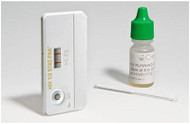Unveiling RSV with Quick Testing
Aug 2nd 2024 | Posted by Wael Tinawi, MBA
RSV Rapid Test: Quick and Accurate Diagnosis
Respiratory Syncytial Virus, or RSV, is a common virus that affects the respiratory tract and can lead to serious complications in young children and older adults. Rapid and accurate diagnosis of RSV is crucial for timely and effective management of the infection. This is where RSV rapid tests play a critical role.
What is an RSV Rapid Test?
An RSV rapid test is a diagnostic tool used to quickly detect the presence of RSV antigens in respiratory specimens, such as nasal swabs or nasopharyngeal secretions. The test is based on immunoassay technology, which allows for the rapid and specific identification of RSV antigens in patient samples.
How Does It Work?
The RSV rapid test operates on the principle of antigen-antibody interaction. When a patient sample is applied to the test device, any RSV antigens present in the sample will bind to specific antibodies coated on the test membrane. This interaction produces a visible signal, such as a color change, indicating a positive result for RSV infection.
Advantages of RSV Rapid Test
- Speed: The most significant advantage of RSV rapid tests is their ability to provide results within 15-30 minutes, enabling healthcare providers to initiate appropriate treatment promptly.
- Accuracy: RSV rapid tests have high sensitivity and specificity, leading to reliable and trustworthy results.
- Point-of-care Testing: These tests can be performed at the point of care, such as in clinics or emergency departments, allowing for immediate decision-making regarding patient management.
- Reduced Transmission: Rapid diagnosis of RSV can help in implementing infection control measures to prevent the spread of the virus within healthcare facilities.
- Optimized Resource Utilization: By quickly identifying RSV-positive patients, healthcare resources can be efficiently allocated, and unnecessary treatments or antibiotics can be avoided in RSV-negative cases.
Considerations
While RSV rapid tests offer significant advantages, it's important to note that they have limitations. The timing of testing in relation to symptom onset can impact the accuracy of results, and false negatives or positives are possible. Therefore, clinical judgment and consideration of the patient's overall condition are essential for accurate diagnosis and treatment decisions.
Conclusion
In conclusion, RSV rapid tests are valuable tools for the rapid and accurate diagnosis of RSV infections. Their ability to deliver quick results with high accuracy makes them indispensable in the clinical management of patients with RSV. As technology continues to advance, we can expect further improvements in the performance and accessibility of RSV rapid tests, ultimately benefiting patients and healthcare providers alike.

